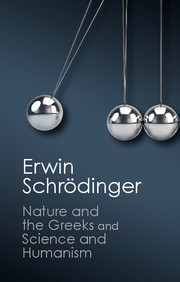Book contents
- Frontmatter
- Contents
- Foreword
- NATURE AND THE GREEKS
- SCIENCE AND HUMANISM
- Dedication
- Preface
- The spiritual bearing of science on life
- The practical achievements of science tending to obliterate its true import
- A radical change in our ideas of matter
- Form, not substance, the fundamental concept
- The nature of our ‘models’
- Continuous description and causality
- The intricacy of the continuum
- The makeshift of wave mechanics
- The alleged break-down of the barrier between subject and object
- Atoms or quanta-the counter-spell of old standing, to escape the intricacy of the continuum
- Would physical indeterminacy give free will a chance?
- The barto prediction, according to Niels Bohr
The alleged break-down of the barrier between subject and object
Published online by Cambridge University Press: 05 October 2014
- Frontmatter
- Contents
- Foreword
- NATURE AND THE GREEKS
- SCIENCE AND HUMANISM
- Dedication
- Preface
- The spiritual bearing of science on life
- The practical achievements of science tending to obliterate its true import
- A radical change in our ideas of matter
- Form, not substance, the fundamental concept
- The nature of our ‘models’
- Continuous description and causality
- The intricacy of the continuum
- The makeshift of wave mechanics
- The alleged break-down of the barrier between subject and object
- Atoms or quanta-the counter-spell of old standing, to escape the intricacy of the continuum
- Would physical indeterminacy give free will a chance?
- The barto prediction, according to Niels Bohr
Summary
It cannot be denied that the new physical aspect of nature of which I have tried to give you some idea by this example is very much more complicated than the old way which I called ‘the classical ideal of uninterrupted, continuous description’. The very serious question arises naturally: Is this new and unfamiliar way of looking at things, which is at variance with the habits of everyday thinking—is it deeply rooted in the facts of observation, so that it has come to stay and will never by got rid of again $ or is this new aspect perhaps the mark, not of objective nature, but of the setting of the human mind, of the stage that our understanding of nature has reached at present?
This is an extremely difficult question to answer, because it is not even absolutely clear what this antithesis means: objective nature and human mind. For on the one hand I undoubtedly form part of nature, while on the other hand objective nature is known to me as a phenomenon of my mind only. Another point that we must keep in mind in pondering this question is this: that one is very easily deceived into regarding an acquired habit of thought as a peremptory postulate imposed by our mind on any theory of the physical world.
- Type
- Chapter
- Information
- 'Nature and the Greeks' and 'Science and Humanism' , pp. 151 - 157Publisher: Cambridge University PressPrint publication year: 2014



